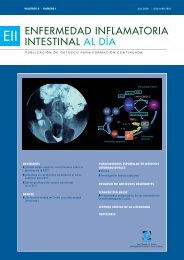Número 1 - EII al dÃa
Número 1 - EII al dÃa
Número 1 - EII al dÃa
Create successful ePaper yourself
Turn your PDF publications into a flip-book with our unique Google optimized e-Paper software.
REVISIONES<br />
Hepatotoxicidad de los fármacos utilizados en la<br />
Enfermedad Inflamatoria Intestin<strong>al</strong><br />
G. Bastida y M. Aguas<br />
Servicio de Medicina Digestiva. Hospit<strong>al</strong> Universitario La Fe. V<strong>al</strong>encia. España<br />
Resumen<br />
La hepatotoxicidad es un problema de s<strong>al</strong>ud creciente. La mayoría de los fármacos utilizados en el manejo de la Enfermedad<br />
inflamatoria intestin<strong>al</strong> han sido asociados con toxicidad hepática, aunque la incidencia glob<strong>al</strong> de este efecto adverso es baja.<br />
La hepatotoxicidad inducida por inmunosupresores tiopurínicos tiene una incidencia aproximada del 3-10%, suele ser un<br />
hecho precoz y se asocia <strong>al</strong> sexo masculino. Se han descrito tanto lesiones colestáticas como hepatocelulares durante el tratamiento<br />
con tiopurínicos. Su mecanismo de toxicidad no se conoce con precisión, pero éste puede ser producido tanto por<br />
un mecanismo dependiente de dosis como idiosincrásico. Una vez que se detectan anorm<strong>al</strong>idades en las enzimas hepáticas,<br />
el tratamiento sólo debe de ser retirado en un pequeño porcentaje de pacientes, probablemente, estas anorm<strong>al</strong>idades tempor<strong>al</strong>es<br />
reflejan un mecanismo de tolerancia <strong>al</strong> fármaco. Debido a la incidencia de hepatotoxicidad se recomienda la monitorización<br />
de los pacientes tratados con azatioprina o 6-mercaptopurina.<br />
El uso de infliximab se asocia con poca frecuencia a la aparición de hepatotoxicidad. Hay casos descritos de hepatitis colestática<br />
asociada con anticuerpos antinucleares y anti-DNAds: en estos pacientes el tratamiento con corticoides fue efectivo. Más<br />
relevante durante el tratamiento con infliximab es la posible reactivación de una hepatitis crónica B que puede incluso provocar<br />
un f<strong>al</strong>lo hepático fulminante. Actu<strong>al</strong>mente, antes de iniciar tratamiento con infliximab, además de una posible infección<br />
tuberculosa, es indispensable descartar con serología una infección crónica por el virus de la hepatitis B, y en caso de ser positiva,<br />
considerar el tratamiento profiláctico.<br />
La hepatotoxicidad asociada con metotrexato está bien descrita, aunque la incidencia en pacientes con enfermedad inflamatoria<br />
intestin<strong>al</strong> no está bien estudiada. La elevación de las enzimas hepáticas se observa con relativa frecuencia, aunque es<br />
infrecuente observar una lesión hepática grave. No se recomienda actu<strong>al</strong>mente re<strong>al</strong>izar biopsias hepáticas sistemáticas, con<br />
los datos disponibles, las recomendaciones de otras guías publicadas (Psoriasis task force or American Collage of<br />
Reumathology) pueden ser utilizadas en pacientes con enfermedad inflamatoria intestin<strong>al</strong>. Con frecuencia, las lesiones hepáticas<br />
se observan en pacientes con otros factores de riesgo potenci<strong>al</strong>es como la obesidad, el abuso de <strong>al</strong>cohol, o el hígado<br />
graso. Basados en estas consideraciones, el tratamiento con metotrexate debería de ser v<strong>al</strong>orado con cautela en aquellos<br />
pacientes con factores de riesgo. Al igu<strong>al</strong> que los pacientes tratados con tiopurínicos, los pacientes deben de tener monitorizadas<br />
su bioquímica hepática.<br />
Los aminoslicilatos rara vez causan hepatotoxicidad. La mayoría de los casos publicados han sido en pacientes tratados con<br />
sulfas<strong>al</strong>azina y el patrón clínico más frecuentemente descrito la lesión hepatocelular aguda. Su incidencia se ha c<strong>al</strong>culado en<br />
menos de 3.1 casos por cada millón de prescripciones.<br />
Summary<br />
Hepatotoxicity is an increasing he<strong>al</strong>th problem. Most of the drugs used in the medic<strong>al</strong> management of Inflammatory Bowel<br />
Disease have been associated with liver toxicity, <strong>al</strong>though the over<strong>al</strong>l incidence of this adverse effect is low. Hepatotoxicity related<br />
to thiopurinic immunomodulators (azathioprine or 6-mercaptopurune) has an incidence of 3 to 10%. It is observed most<br />
of times at the begining of treatment and is more frequent in m<strong>al</strong>es. Both cholestatic and hepatocelullar injury have been described<br />
during thipopurinic treatment. The mechanism of toxicity is not fully understood and could be either dose dependent<br />
or idyosincratic. Once liver enzyme elevations are detected, the treatment should be withdrawn only in a sm<strong>al</strong>l percentage of<br />
patients, probably these tempor<strong>al</strong> enzyme abnorm<strong>al</strong>ities are reflecting a mechanism of tolerance. Due to its incidence, biochemic<strong>al</strong><br />
monitoring is suggested during azathioprine or 6-mercaptopurine treatment.<br />
Infliximab is infrequently associated with hepatotoxicity. There are cases described of cholestatic liver injury associated with<br />
antinuclear and double-stranded DNA antibodies: these patients had a good response to treatment with corticosteroids. More<br />
important during infliximab treatment is the potenti<strong>al</strong> chronic hepatitis B reactivation that could lead to a fulminant hepatic<br />
failure. Nowadays previously to infliximab therapy, as well as tuberculosis infection, is mandatory to rule out chronic hepatitis<br />
B infection with serologic<strong>al</strong> markers and to consider prophylaxis of reactivation using antivir<strong>al</strong> therapy if positive.<br />
Hepatotoxicity secondary to methotrexate is well described, but its incidence in patients with Inflammatory bowel disease has<br />
not been studied fully. Liver enzyme elevations are common during treatment with methotrexate, <strong>al</strong>though severe liver injury<br />
can be seen only in a sm<strong>al</strong>l percentege of patients. Follow-up liver biopsies should not be performed systematic<strong>al</strong>ly, existing<br />
data suggest that recommendations of published guidelines (Psoriasis task force or American Collage of Reumathology) could<br />
be used in patients with Inflammatory Bowel Disease. Often, hepatic damage related to methotrexate was seen in patients<br />
2 • Enfermedad Inflamatoria Intestin<strong>al</strong> <strong>al</strong> día - Vol. 5 - Nº. 1 - 2006











